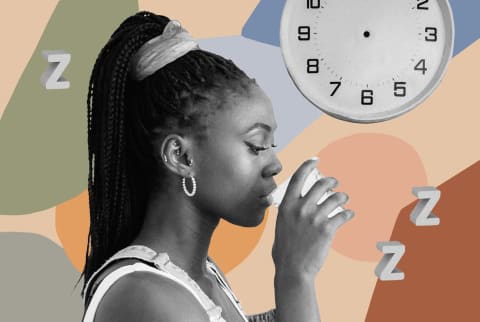Advertisement
An MD Weighs In On When To Take Melatonin vs. Magnesium


In a time when sleep can be hard to come by, many of us are reaching for reinforcements. When it comes to sleep aids, magnesium and melatonin are two of the most popular options.* While both can be effective, they work in different ways.* During a recent virtual mbg masterclass, functional medicine doctor and expert in all things sleep Robert Rountree, M.D., weighed in on when he recommends taking one over the other. Here's the sleep scoop:
Take melatonin for: Falling asleep at a time that your body isn't used to.*
Melatonin is a hormone that our body naturally sends out based on lighting cues, which is why it's often referred to as the "hormone of darkness."
"Melatonin is a signal for the brain that it's time to go to sleep," Rountree said. "It doesn't knock you out. It doesn't make you sleep. It simply tells the brain this is the time to go to sleep."*
This means that supplemental forms of the hormone can be good for people who have variable sleep schedules and need to fall asleep at wonky hours from time to time (hence why it's so popular for jet lag1 and night working).* By that logic, if you wake up in the middle of the night and need to fall back asleep, Rountree says that taking a small dose of melatonin (0.5 to 1.5 milligrams) may also help.*
Basically, this supplement lays the groundwork by telling our bodies that it's time for bed—even if our outside environment says otherwise.* Once it sends this signal, though, its job is done. It doesn't do much in the way of improving sleep quality, which is part of why some people report feeling groggy and sleepy in the morning after taking it (and also because they take too much melatonin too often). "It's not that great for people who are just poor sleepers," Rountree explained.
Take magnesium for: Nightly sleep support.*
Compared to melatonin, Rountree says that magnesium is more helpful for supporting overall sleep quality.* Early research suggests that the mineral can kick-start hours of calm and relaxation—especially when it's combined in the chelate complex format with the amino acid glycine (i.e., magnesium bisglycinate).*
"Magnesium helps to calm the central nervous system, which helps to prepare the brain to turn off and also to keep it functioning at a calmer level throughout the night,"* Rountree told mbg.*
So while melatonin is a quick signal to go to bed, magnesium is more of a steady, long-lasting sleep enhancer.* It's what you'll find in mbg's sleep support+ supplement, which has quickly become a bestseller for its ability to help people not only fall asleep but stay asleep through the night and wake up feeling refreshed.* Taking the targeted formula of magnesium bisglycinate, PharmaGABA®, and jujube 1-2 hours before bedtime can send the body into sleep mode—and keep it there until the next morning, reviewers say.*
The bottom line.
While melatonin is great at sending a signal to the body that it's time to go to sleep, magnesium picks up where it leaves off and helps promote high-quality rest.* Melatonin is a good supplement to have in your back pocket if you're traveling to a new time zone or need to pick up a night shift, and magnesium tends to be better for nightly use.*
Watch Next
Enjoy some of our favorite clips from classes
Enjoy some of our favorite clips from classes
What Is Meditation?
Mindfulness/Spirituality | Light Watkins
Box Breathing
Mindfulness/Spirituality | Gwen Dittmar
What Breathwork Can Address
Mindfulness/Spirituality | Gwen Dittmar
The 8 Limbs of Yoga - What is Asana?
Yoga | Caley Alyssa
Two Standing Postures to Open Up Tight Hips
Yoga | Caley Alyssa
How Plants Can Optimize Athletic Performance
Nutrition | Rich Roll
What to Eat Before a Workout
Nutrition | Rich Roll
How Ayurveda Helps Us Navigate Modern Life
Nutrition | Sahara Rose
Messages About Love & Relationships
Love & Relationships | Esther Perel
Love Languages
Love & Relationships | Esther Perel
What Is Meditation?
Box Breathing
What Breathwork Can Address
The 8 Limbs of Yoga - What is Asana?
Two Standing Postures to Open Up Tight Hips
How Plants Can Optimize Athletic Performance
What to Eat Before a Workout
How Ayurveda Helps Us Navigate Modern Life
Messages About Love & Relationships
Love Languages
Advertisement

What Men Are Getting Wrong About Mental Health, From A Psychologist
Stephen B. Poulter, PhD

Your Grandma's Go-To Supplement Is Once Again Popular (For A Good Reason)
Molly Knudsen, M.S., RDN

What Men Are Getting Wrong About Mental Health, From A Psychologist
Stephen B. Poulter, PhD

Your Grandma's Go-To Supplement Is Once Again Popular (For A Good Reason)
Molly Knudsen, M.S., RDN














